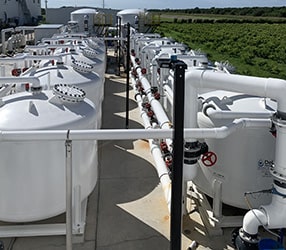 Industrial water systems use water filters to reduce the level of solids in water from:
Industrial water systems use water filters to reduce the level of solids in water from:
- Industrial
- Semiconductor
- Manufacturing
- Refining
- Oil and Natural Gas Production Processes
The wastewater may contain harmful chemicals to humans, plants, or animals. Three types of filters are commonly used in industrial settings:
Gravity filters, pressure filters, and constructed wetlands. Pressure filters have two variations: multimedia and higher-pressure micron or cartridge filters. Constructed wetlands or natural filters are not often utilized in industrial processes. Based on the requirements to obtain environmental permits and safeguard the ecosystem.
There are many benefits to pressure filtering systems in industrial wastewater. Pressure filters can remove particles down to 0.3 microns in size. They don't clog up as quickly as other filter types, and it's much faster than other types of filtration methods.
Pressure filtering is also very cost-effective because it uses less energy than other methods. Look no further if you're looking for a high-quality industrial water filter that cuts down on operating costs!
Pressure Filters (Multimedia type) are often used in industrial settings to filter particulates down to 15 microns in size.
They're also very cost-effective due to their energy; pressure filters utilize much less energy than other filtration methods. Pressure filters can include multimedia, a mixture of gravel and sand, multimedia, gravel, sand, and anthracite, or multimedia, which combines gravel, sand, greensand, and anthracite filter media. The variations are dependent on the applications and the need.
Pressure filter systems rarely get clogged up as quickly as other types of filters. They are very fast compared to other filtrate filters. Pressure filters have a sealed pipe on both ends. it puts the water under pressure and forces it through the filter material. This type of filter has a water outlet at one end for removing those solids from the process.
The only drawback of this commercial water filter is that it needs a lot of space for installation.
Which may not always be possible in tight areas like oil refineries or natural gas plants. Micron or cartridge filters can remove solids down to 0.1 microns. They rely on higher efficient cartridges inserted into a high-pressure filter. These filters are commonly utilized post-multimedia filtration, pre-reverse osmosis, or membrane filtration.
Gravity Filters are typically designed with open tops and operate entirely by gravity.
Nonfiltered water enters the top of the filter and travels down through the layers of sand and gravel removing the solids. With the lower hydraulic load design, gravity filters are less efficient and require more space. Due to higher maintenance costs, lower efficiency, and a higher degree of plugging they are not utilized as often.
Constructed Wetlands are an eco-friendly way to clean up wastewater. Filtering pollutants from the water through different zones, which have been designed to remove or absorb nutrients and contaminants. There are three zones typically found in constructed wetlands. They are the slow flow zone, the intermediate flow zone, and the rapid flow zone.
In a constructed wetland, water will enter from the top of the wetland. In the slow zone, it filters out pollutants before passing them on to the next zone.
The intermediate flow zone is a fast-moving stream where most floating particles will be filtered out. Some fish may also live in this zone and eat many organisms too big for the first two zones to catch.
The Rapid flow zone is a typical pond with no currents. Has plants at the bottom that can absorb any leftover pollutants.
Constructed wetlands do not use chemicals such as chlorine or ammonia to clean up water. They use natural processes to clean up the wastewater. When allowed and designed correctly, they are very environmentally friendly and safe for plants and animals living in them!
One of the most common industrial water filters is a pressure filter. They are widely used because they are effective, affordable, and easy to maintain.
Pressure filters use a variety of methods to create clean water.
When wastewater enters the filter, it passes over multimedia material. The water travels to the bottom of the filter, collecting the solids trapped in the media material.
The pressure created by the incoming water forces the water to be pushed through the multimedia layers. It then eventually leaves through an under-drain system at the filter's bottom. This creates clean water free of solids like oil, heavy metals, or chemicals larger than 15 microns. In addition, if greensand is added as one of the media layers, the pressure filter will remove iron from the water.
There are numerous advantages to using pressure filtration for industrial wastewater. Some include how effective it is at removing particles down to 15 microns in size. Compared to other types of water filtration systems and methods like constructed wetlands and mechanical filters, they are inexpensive and quick.
In conclusion, a pressure filter is an excellent solution for industrial water treatment.
They are an inexpensive option that is easy to maintain and can remove various contaminants with minimal effort. Contact one of our experts at DeLoach Industries Inc. for full design support and selection.
Pressure filters can also handle large volumes of water, which are perfect for treating water at a plant or refinery. They can also handle varying levels of pressure, which means they can work with any type of water pressure.
If you are looking for a way to remove contaminants from your water safely, pressure filters are an excellent investment. Reducing the number of chemicals that are being used can remove more contaminants than you would with a gravity filter.
When looking for the best option for your industrial water treatment, look no further than DeLoach Industries Inc. pressure filters. They are inexpensive, reliable, and can be adjusted for any size system. If you have any questions, please contact the DeLoach Industries, Inc. professionals at 941.371.4995.




